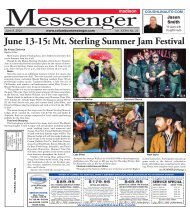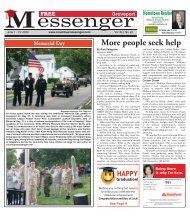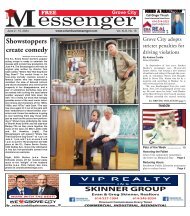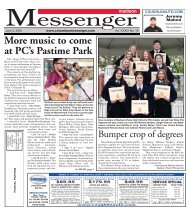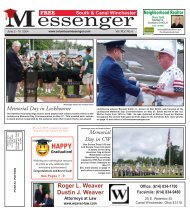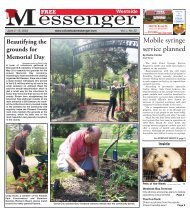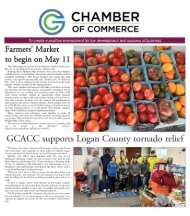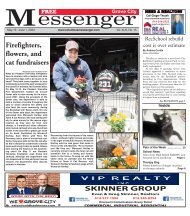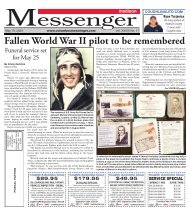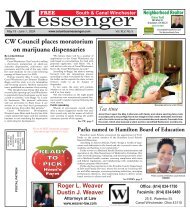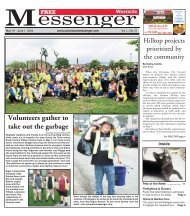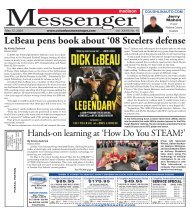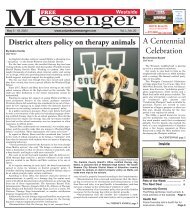Canal Winchester Messenger - May 15th, 2022
Create successful ePaper yourself
Turn your PDF publications into a flip-book with our unique Google optimized e-Paper software.
Eat healthy at 50 and beyond<br />
www.columbusmessenger.com <strong>May</strong> 15, <strong>2022</strong> - MESSENGER - PAGE 11<br />
A balanced diet is an integral element of<br />
a healthy lifestyle for men, women and<br />
children alike. But while kids and young<br />
adults might be able to get away with an<br />
extra cheeseburger here or there, men and<br />
women approaching 50 have less leeway.<br />
According to the National Institute on<br />
Aging, simply counting calories without<br />
regard for the foods being consumed is not<br />
enough for men and women 50 and older to<br />
maintain their long-term health. Rather,<br />
the NIA emphasizes the importance of<br />
choosing low-calorie foods that have a lot of<br />
the nutrients the body needs.<br />
But counting calories can be an effective<br />
and simple way to maintain a healthy<br />
weight, provided those calories are coming<br />
from nutrient-rich foods. The NIA advises<br />
men and women over 50 adhere to the following<br />
daily calorie intake recommendations<br />
as they attempt to stay healthy into<br />
their golden years.<br />
Women:<br />
•Not physically active: 1,600 calories.<br />
•Somewhat active: 1,800 calories.<br />
•Active lifestyle: between 2,000 and<br />
2,200 calories.<br />
Men:<br />
•Not physically active: 2,000 calories.<br />
•Somewhat active: between 2,200 and<br />
2,400 calories.<br />
•Active lifestyle: between 2,400 and<br />
2,800 calories.<br />
When choosing foods to eat, the NIA recommends<br />
eating many different colors and<br />
types of vegetables and fruits.<br />
Phytochemicals are substances that occur<br />
naturally in plants, and there are thousands<br />
of these substances offering various<br />
benefits.<br />
The NIA advises men and women over 50<br />
make sure at least half the grains in their<br />
diets are whole grains. Numerous studies<br />
have discovered the various benefits of<br />
whole grains, which are loaded with protein,<br />
fiber, antioxidants and other nutrients.<br />
Another potential hurdle men and<br />
women over 50 may encounter is a change<br />
in their sense of smell and taste. A person’s<br />
sense of smell may fade with age, and<br />
because smell and taste are so closely related,<br />
foods enjoyed for years may no longer<br />
tantalize the taste buds. That can be problematic,<br />
as many people instinctually add<br />
more salt to foods they find bland.<br />
According to the U.S. Office of Disease<br />
Prevention and Health Promotion, older<br />
adults should consume no more than 1,500<br />
milligrams of sodium per day. That<br />
equates to roughly 3/4 teaspoon of salt.<br />
Older men and women should resist the<br />
temptation to use salt to add flavor to<br />
foods, instead opting for healthy foods that<br />
they can still smell and taste.<br />
Maintaining a healthy diet after 50 may<br />
require some hard work and discipline. But<br />
the long-term benefits of a healthy diet<br />
make the extra effort well worth it.<br />
Active Lifestyles<br />
Arthritis and exercise<br />
<strong>May</strong> is Older Americans Month, a nationwide<br />
awareness campaign led by the Administration<br />
for Community Living (ACL) that observes the<br />
positive impact older adults make in society. ACL<br />
sets a theme each year to celebrate the month.<br />
This year’s theme is “Aging in Place,” which<br />
focuses on how older adults can stay in their<br />
homes and live independently in their communities<br />
for as long as possible.<br />
The theme ties directly into the work of<br />
Central Ohio Area Agency on Aging (COAAA).<br />
COAAA arranges and coordinates in-home services<br />
that help older adults and individuals with<br />
disabilities live independently in their homes.<br />
Exercise can be beneficial in the treatment<br />
of arthritis, say many doctors.<br />
Physical activity can reduce stiffness<br />
and increase muscle strength and flexibility.<br />
It also has overall health benefits, such<br />
as improving cardiac fitness and physical<br />
endurance. Three types of exercise are<br />
most appropriate for those who have<br />
arthritis:<br />
•Strength training: Strong muscles help<br />
support and protect joints affected by<br />
arthritis. Lifting weights can provide this.<br />
•Range of motion exercises: Dancing,<br />
tai chi, Pilates, swimming, and other activities<br />
that push the body to stretch and<br />
move help maintain normal joint motion<br />
and relieve stiffness.<br />
•Aerobic activities: Activities such as<br />
brisk walking, bicycle riding, skating and<br />
more are good for the heart. They also moderate<br />
weight, which in turn puts less strain<br />
on joints, particularly the knees. Some<br />
studies show that aerobic exercise can<br />
reduce inflammation in some joints.<br />
Before beginning an exercise program,<br />
discuss with your doctor what activities<br />
might be right for you.<br />
PAID ADVERTISING<br />
Older Americans Month<br />
COAAA is proud to help people live independently,<br />
but the agency knows that age does not<br />
define a person’s energy and vitality, which is<br />
why it hosts the Central Ohio Senior Citizens<br />
Hall of Fame to acknowledge exemplary older<br />
adults for serving their communities and enriching<br />
the lives of others.<br />
Eleven inductees will be honored later in the<br />
month during the annual recognition ceremony.<br />
COAAA is proud to celebrate Older Americans<br />
Month by helping older adults live independently,<br />
and through the Hall of Fame, where active and<br />
vibrant older adults are honored for their community<br />
service.<br />
‘MEDICARE FOR BEGINNERS’<br />
VIRTUAL WORKSHOPS<br />
Are you new to Medicare?<br />
Do you need help understanding your options?<br />
Central Ohio Area Agency on Aging’s (COAAA) FREE ‘Medicare for<br />
Beginners’ workshops provide unbiased information to help you make<br />
informed decisions. Workshops are only being offered through Zoom at<br />
the present time. Join us for our upcoming workshop:<br />
Wednesday, <strong>May</strong> 25 at 2:00 p.m.<br />
Registration is required. To register, email Andy Haggard, COAAA<br />
Medicare Outreach Manager, at ahaggard@coaaa.org or call 800-589-7277.<br />
www.coaaa.org/medicare Funded in part by:<br />
This project was supported in part by grant number 2101OHMIAA/MIDR-00 from the U.S. Administration for Community Living,<br />
Department of Health and Human Services, Washington D.C. 20201. Subrecipients undertaking a project with government sponsorship<br />
are encouraged to express freely their findings and conclusions. Points of view or opinions do not, therefore, necessarily represent official ACL policy.




